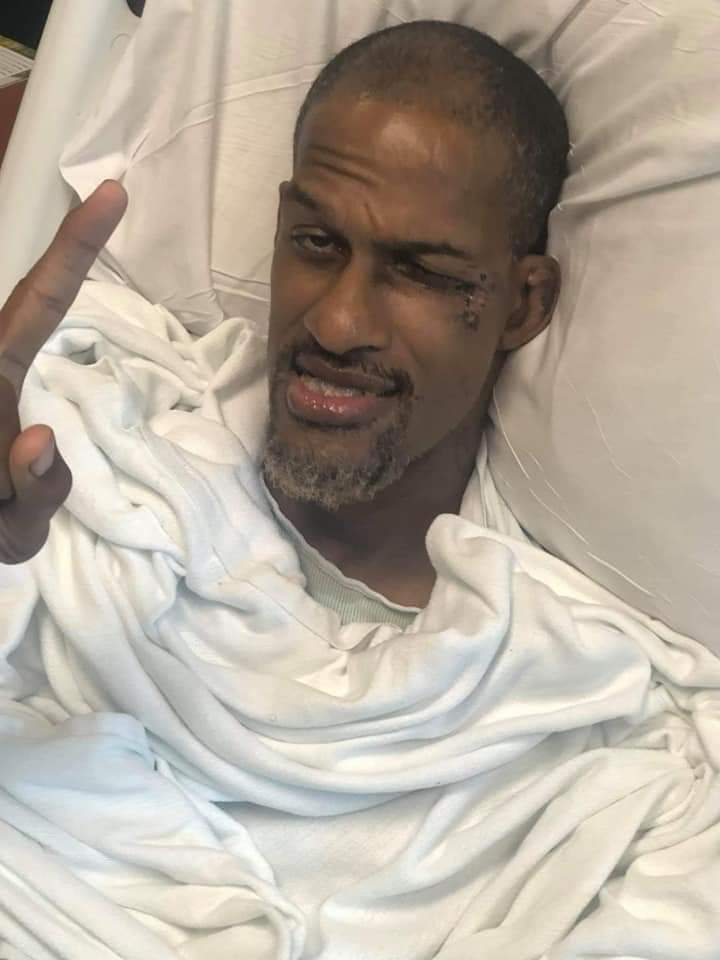Raising Meeka'eel: An Autistic Life
Originally published in the Denver Post, July 12, 2006
"Something's not right with him," I told his mother...
My stepson, Meeka'eel, was 2 years old. He cried so incessantly that we couldn't help but think it was a substitute for talking. He would stare into space but never look anyone in the face. In the middle of the night, he would either giggle to himself or shriek loudly for hours.
When he was 3, our suspicions were confirmed when Meek was diagnosed with autism. According to the National Institute of Mental Health, one in every 166 children born in the U.S. is, like our son, confined to a mysterious world marked by abnormal interaction and behavior.
That was 10 years ago. In that time, we have watched Meek struggle and grow into an uncertain future. As a toddler, he'd never eat right and couldn't master toilet training. Early on, we were fortunate enough to enroll him in a program at University Hospital that studied childhood disorders. But within a year, funding dried up and the program closed down.
We were relegated to preparing Meek for public school.
Early on, public school was really just day care for Meek. We knew that there was no way he could get any benefit from being in a class full of kids with disorders at various levels of severity, led by one overworked teacher and a twentysomething classroom aide. In fact, while Meek was not severely autistic, he often regressed by imitating the more severe behavior of his classmates, such as hitting himself or screaming.
At 7 years old, Meek couldn't read or write well and still had to have someone tie his shoes. His eating habits went from bad to plain weird, like eating sticks of butter.
At home, we have always tried to treat Meek like any other kid, and in many ways he exhibits normal childhood behaviors. When he drew cartoon murals on almost every wall in the house one night, we were angry at his mischief but secretly marveled at how good the drawings were. Sure, I was upset when he gave his sister's dolls crew-cuts, but it was great to see him do the kinds of stuff I did to my little sisters when I was young.
An angel briefly entered Meek's life at Denver's Wyman Elementary. The school recruited Lisa Garrity, a young, energetic teacher from New York. From the first parent-teacher meeting with my wife, it was clear there would be a new sheriff in Meek's town. In less than a year, Meek learned to read, tie his shoes, and communicate his needs using the word "I."
Compared to the crying scribbler in velcroed shoes, what Garrity did with Meek was nothing short of a miracle.
While Meek's progress was dramatic, it was also short-lived. The next year, the school district inexplicably transferred him to another school, Philips Elementary - and back to "day care." He's now at Morey Middle School, where the attention he receives is less than ideal.
Now, at 13, Meek communicates a little better and we continue to marvel at his savant abilities, like his amazing drawing talent, his aptitude for architecture (he's made construction-paper floor models of his school - to scale) and his ability to play piano by ear. However, Meek still faces an uncertain future, a future that certainly causes us worry.
Yet stories of autistic adults give us some hope. Maybe Meek can be another Temple Grandin, the CSU professor, author and speaker whose abilities translated to a career in animal welfare and autism advocacy. Or maybe he can be another Sue Rubin, a college junior who was the subject and writer of "Autism is a World," an Oscar-nominated documentary.
Things do look rough down the road for our son. While there is increased interest in autism, services are woefully lacking. At his young age, we have to enroll Meek now to receive adult services in the hopes they will be available by the time he is 21. Autism therapies like applied behavioral analysis are not publicly funded in Colorado, and most parents don't have an extra $40,000 yearly to foot the bill for such treatment.
With so little help today, Meek's future is cloudy. Will he be able to drive or even ride the bus himself? Go shopping? Live on his own? Have a job? As his parents, we hope so - but simply don't know.
My stepson, Meeka'eel, was 2 years old. He cried so incessantly that we couldn't help but think it was a substitute for talking. He would stare into space but never look anyone in the face. In the middle of the night, he would either giggle to himself or shriek loudly for hours.
When he was 3, our suspicions were confirmed when Meek was diagnosed with autism. According to the National Institute of Mental Health, one in every 166 children born in the U.S. is, like our son, confined to a mysterious world marked by abnormal interaction and behavior.
That was 10 years ago. In that time, we have watched Meek struggle and grow into an uncertain future. As a toddler, he'd never eat right and couldn't master toilet training. Early on, we were fortunate enough to enroll him in a program at University Hospital that studied childhood disorders. But within a year, funding dried up and the program closed down.
We were relegated to preparing Meek for public school.
Early on, public school was really just day care for Meek. We knew that there was no way he could get any benefit from being in a class full of kids with disorders at various levels of severity, led by one overworked teacher and a twentysomething classroom aide. In fact, while Meek was not severely autistic, he often regressed by imitating the more severe behavior of his classmates, such as hitting himself or screaming.
At 7 years old, Meek couldn't read or write well and still had to have someone tie his shoes. His eating habits went from bad to plain weird, like eating sticks of butter.
At home, we have always tried to treat Meek like any other kid, and in many ways he exhibits normal childhood behaviors. When he drew cartoon murals on almost every wall in the house one night, we were angry at his mischief but secretly marveled at how good the drawings were. Sure, I was upset when he gave his sister's dolls crew-cuts, but it was great to see him do the kinds of stuff I did to my little sisters when I was young.
An angel briefly entered Meek's life at Denver's Wyman Elementary. The school recruited Lisa Garrity, a young, energetic teacher from New York. From the first parent-teacher meeting with my wife, it was clear there would be a new sheriff in Meek's town. In less than a year, Meek learned to read, tie his shoes, and communicate his needs using the word "I."
Compared to the crying scribbler in velcroed shoes, what Garrity did with Meek was nothing short of a miracle.
While Meek's progress was dramatic, it was also short-lived. The next year, the school district inexplicably transferred him to another school, Philips Elementary - and back to "day care." He's now at Morey Middle School, where the attention he receives is less than ideal.
Now, at 13, Meek communicates a little better and we continue to marvel at his savant abilities, like his amazing drawing talent, his aptitude for architecture (he's made construction-paper floor models of his school - to scale) and his ability to play piano by ear. However, Meek still faces an uncertain future, a future that certainly causes us worry.
Yet stories of autistic adults give us some hope. Maybe Meek can be another Temple Grandin, the CSU professor, author and speaker whose abilities translated to a career in animal welfare and autism advocacy. Or maybe he can be another Sue Rubin, a college junior who was the subject and writer of "Autism is a World," an Oscar-nominated documentary.
Things do look rough down the road for our son. While there is increased interest in autism, services are woefully lacking. At his young age, we have to enroll Meek now to receive adult services in the hopes they will be available by the time he is 21. Autism therapies like applied behavioral analysis are not publicly funded in Colorado, and most parents don't have an extra $40,000 yearly to foot the bill for such treatment.
With so little help today, Meek's future is cloudy. Will he be able to drive or even ride the bus himself? Go shopping? Live on his own? Have a job? As his parents, we hope so - but simply don't know.




Comments